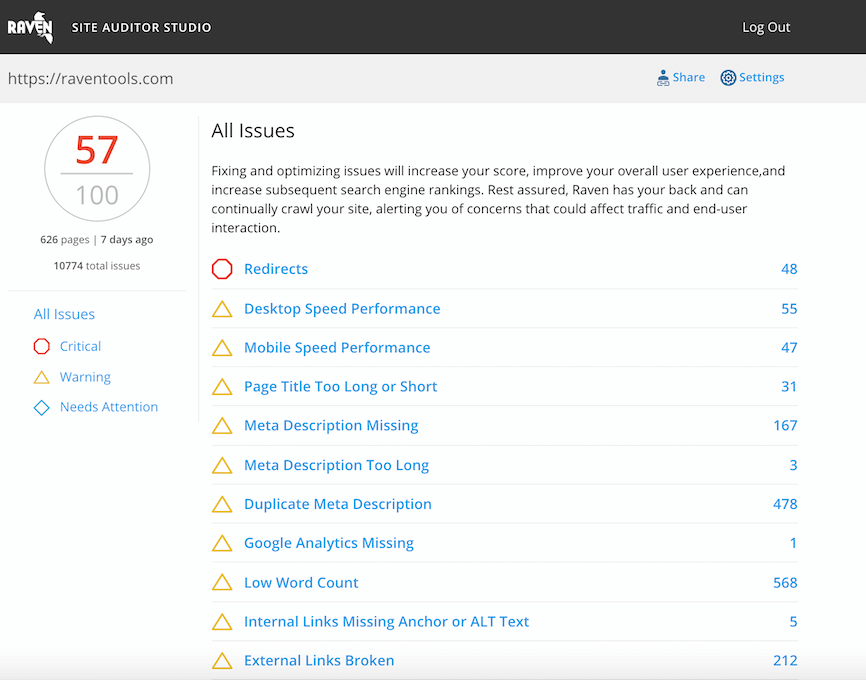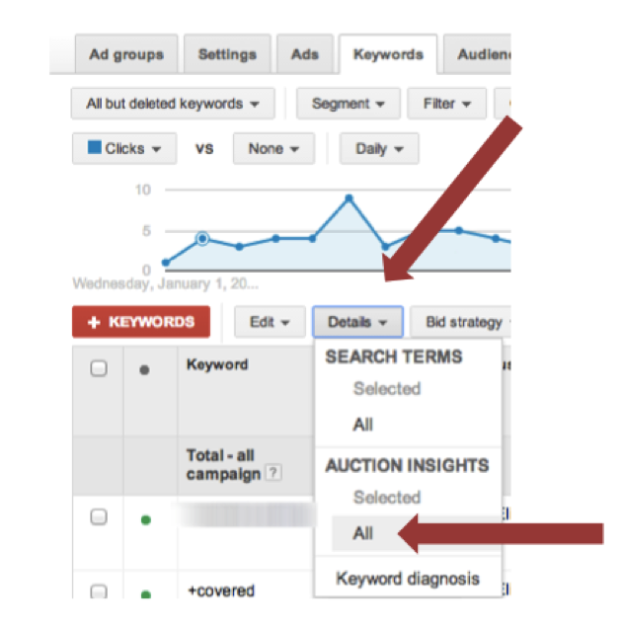Competitive research can be an overwhelming thing for organic search marketers, and paid search is no different.
The bounty of information you can access to uncover paid keyword strategies is massive with tools like Raven software or SEMrush. These tools are a keyword wonderland to a nerd like me, but that also means there’s far more than I need, which can be distracting. Not to mention that there are bunches of ways to analyze that data for competitive insights.
But it’s important to know what your competitors are doing, especially if what they’re doing…well…sucks.
Let’s focus, then. First we’ll talk about the most common way I see people do it, and then one way you can take an existing but little-known Google AdWords report to pry deeper into the competition. I’ll explain how then to use the tools to stay on target.
The Common Way: Asking the Client Who The Competition Is
It’s not that this is bad, but it can be scarily myopic. Let’s say the paid search account you’re looking to set up specializes in fence repair. You ask the client for their competitors, and they name Bob and Larry, their two arch rivals in the area. You dig around to see what Bob and Larry are up to, and start bidding. Then you get into the live marketplace on Google AdWords and get clobbered.
Danger No. 1: Competitors Aren’t Who You Thought
You and I know that the search universe is humongous, and once you start bidding for search terms, the playing field (and therefore your competition) is exponentially bigger.
Your client might know this in theory, but they will forget all of that as they start telling you about Bob and Larry with that competitive gleam in their eye.
The competition in paid is as steep as it is in organic, just for different reasons. Think about it: there are a limited number of slots on that precious first page. Ads rotate through those all day long over millions of impressions. So although you have more chances to show up there, you have a boatload of competition, and you have to figure out how much you’re willing to pay for it.
Forget Bob and Larry. You’re suddenly competing against much larger, regional companies, and often they’re places your client has never heard of. They’re now not just competing against other local fence repair providers; they’re competing against lead-gen companies selling to a bunch of other fence repair competitors they haven’t bumped into. They’re selling against home services offered by large home improvement chains. It’s a different world than the customer referrals arena they have traditionally relied on for business.
Danger No. 2: All That Glimmers Isn’t Gold
Let’s say you find out Bob and Larry dumping money into PPC by the truckload. You might plug them into a tool like SEMrush and think, “Whoa, these guys have things figured out.”
This is another danger. They’re spending a lot of money and ranking for stuff — but you have no way of knowing if they’re actually getting business or turning a positive ROI for these efforts. What looks impressive initially could be an over-zealous, internal person that has no idea how to really work this stuff like you, and they’re feverishly shoveling money in the gaping maw of Google, waiting for leads to come out the other end.
The Other Way: Doing Competitive Research for the Client
How PPC Competitive Research Helps
If you do it right, you can figure out if competitors suck, and see what they might be doing great. Some of this can be done in certain reports that will show you how you’re doing in paid versus organic, which will give you some direction on where to focus your ad spend. You can see more detailed ranking results now in Raven’s Keyword Ranking tool and make some educated guesses about the terms you’ll never compete for.
Pulling up aspects other than keywords can also be an ace in the hole for you. Is it poorly written, with no call to action? Is it great, and calling out specific competitive advantages that you can leverage? Awesome. Use that.
PPC competitive research never stops. Your competitors that are good at paid search are not sitting idle. Plus, the competitors of today may not be the same ones you face next month. So, how do you know?
A Google AdWords Report That Helps You Find Competitors
There’s a tool in Google AdWords that’s far from perfect, but it can help focus you on the competitors to watch. It’s in the Auction Insights section under your Keywords tab:
You get this nifty chart that shows you some of your paid search competitors and how you stack up in various ways:
Here’s where you can start seeing if your competitors might be doing better than you in regards to the auction piece and placement of AdWords.
I love the Overlap Rate column, because it gives you a good idea of who you’re really on the playing field with at any given time. For example, you may only overlap with Sears or Home Depot a fraction of the time, but they also have bigger budgets, so that’s no surprise. The interesting thing is when you get to the ones where you overlap 30% or more with — these are the guys you’re competing with today.
Taking the Overlap Rate into consideration with the Position Above Rate and Top of Page Rate also gets interesting. You can see who is ranking higher than you, and if they’re also the same advertiser dominating the top of the page.
Start Your PPC Competitive Research After You Have Names
At this point, I jot down who those competitors are and start checking them out in Raven and SEMrush.
If you see them being aggressive with what you glean about rankings from SEMrush, and compare it to their overall website’s performance with Raven’s Research Central, you can start to see where the focus is or isn’t.
You can also make a quick judgment whether organic is even something they’re striving for or remotely have a shot of getting, or if they’re in it for the long haul on most of their paid terms.
Remember, if you have high overlap and your competitor is topping you out on the page, it’s not always because they have a bigger budget or a more competitive bid — they may have spectacular ad copy and a great landing page. Those two things work together to give the advertiser an awesome quality score and thereby a lower CPC.
First, check out their ad copy in SEMrush to see if this is the case.
Then compare it with your results from Raven’s AdWords Insights tool. Is your copy leading to low quality scores? Raven’s AdWords Insights tool shows exactly which pages have quality issues and why.
It might just be time to step up your copywriting or on-page optimization game.
The Bottom Line: Focus on Your Real Competition
Whether you’re brand new to AdWords or looking to see if your competitors are mopping the floor with you, it’s important to be accurate in assessing competition. You have to focus on the competition that matters.
If you’re the local hardware guy, you can’t really compete with Lowe’s online. You can, however, possibly start competing with specialty hardware suppliers that have ecommerce stores. Think small, but understand that “small” in AdWords is a relative term.
Figuring out who your real PPC competition is and finding their untapped or weak strategies will help you launch paid search campaigns you can bank on.

Analyze over 20 different technical SEO issues and create to-do lists for your team while sending error reports to your client.






Are you a fan of using SEMRush as kind of a “copy cheating” tool? There’s a way to export ad copy for your competitors and analyze it. How do you decide what to use when it comes to writing ad copy? Emulate what they’re doing or just write brand new stuff?
Wow, Courtney leaves and your previous RSS feed breaks, the new one doesn’t work either, and your blog comments are filling with spam.
Bring Courtney back!
Aww… Glenn! You hurt my feelings! 😉 The RSS feed broke because we changed over our marketing site and forgot that (important) detail. The new feed should be working now. Give it a whirl? I’ll take care of the spam. And we’re hiring a new organic marketer if you know anyone…